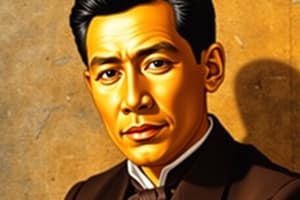Podcast
Questions and Answers
Who is Jose Rizal?
Who is Jose Rizal?
José Protacio Rizal Mercado y Alonso Realonda
What is the birthdate of Jose Rizal?
What is the birthdate of Jose Rizal?
June 19, 1861
What year did Jose Rizal die?
What year did Jose Rizal die?
December 30, 1896
Who choose Rizal to become a national hero?
Who choose Rizal to become a national hero?
Rizal was baptized in the Catholic Church in Calamba, Laguna on __________.
Rizal was baptized in the Catholic Church in Calamba, Laguna on __________.
Which of the following was not listed as a reason for Rizal becoming the greatest national hero?
Which of the following was not listed as a reason for Rizal becoming the greatest national hero?
What were some of the professions of Jose Rizal?
What were some of the professions of Jose Rizal?
Rizal was the first person to have a public funeral in the Philippines.
Rizal was the first person to have a public funeral in the Philippines.
Who was the head of the Taft Commission?
Who was the head of the Taft Commission?
Who is Jose Rizal?
Who is Jose Rizal?
What is the birthdate of Jose Rizal?
What is the birthdate of Jose Rizal?
On what date did Jose Rizal die?
On what date did Jose Rizal die?
Who was the head of the Philippine Revolutionary Government that celebrated Rizal's death anniversary in 1898?
Who was the head of the Philippine Revolutionary Government that celebrated Rizal's death anniversary in 1898?
The day of Rizal's death is marked as a day of national mourning in the Philippines.
The day of Rizal's death is marked as a day of national mourning in the Philippines.
Who chose Rizal to become a National Hero?
Who chose Rizal to become a National Hero?
Match the following criteria to the requirements for being declared a national hero by the Taft Commission:
Match the following criteria to the requirements for being declared a national hero by the Taft Commission:
Why did Rizal become the greatest Filipino National Hero?
Why did Rizal become the greatest Filipino National Hero?
What is the name of the parish priest who baptized Jose Rizal?
What is the name of the parish priest who baptized Jose Rizal?
Flashcards are hidden until you start studying
Study Notes
Who is Jose Rizal
- Full name: José Protacio Rizal Mercado y Alonso Realonda
- Born on June 19, 1861, in Calamba, Laguna, Philippines
- Died on December 30, 1896, executed by the Spanish colonial government
- Multifaceted individual: poet, novelist, historian, architect, painter, educator, linguist, musician, and more
- Considered the "First Malayan Hero" due to his profound impact on Filipino identity and nationalism
- Historical events from the 19th to early 20th centuries significantly influenced his character and contributions
Rizal Day Observance
- First observed by the Philippine Revolutionary Government under Emilio Aguinaldo in 1898
- December 30 designated as a day of national mourning and remembrance
- Observations from Antonio Guevarra noted towns in mourning with flags at half-mast to honor Rizal
- American author Mrs. Dauncey Campbell documented celebrations of "Rizal Day" during her visit in 1904 in Iloilo
Selection as National Hero
- Jose Rizal was chosen by the Taft Commission, led by William Howard Taft
- Commission members included both Americans and Filipinos, such as W. Morgan Shuster and Gregorio Araneta
- Criteria for a National Hero as declared by the Commission:
- Must be Filipino
- Must be deceased
- Must exhibit immeasurable love for the country
- Should have a low temper to represent Filipino emotional sensitivity
- Must have died in a dramatic manner
- Rizal met all the criteria, leading to his designation as the national hero
Significance of Rizal as a National Hero
- Rizal earned immense honor and recognition for his service to humanity, both during his life and posthumously
- Acknowledged by Filipinos and foreigners alike as a foremost leader and advocate for Filipino rights
- Insight from Prof. Blumentritt: described Rizal as the "greatest product of the Philippines" comparable to a rare comet appearing in history
Early Life of Rizal
- Baptized on June 22, 1861, in Calamba, Laguna, by Father Rufino Collantes
- Godfather was Father Pedro Casanas, a family friend and influential figure in his early life
Who is Jose Rizal
- Full name: José Protacio Rizal Mercado y Alonso Realonda
- Born on June 19, 1861, in Calamba, Laguna, Philippines
- Died on December 30, 1896, executed by the Spanish colonial government
- Multifaceted individual: poet, novelist, historian, architect, painter, educator, linguist, musician, and more
- Considered the "First Malayan Hero" due to his profound impact on Filipino identity and nationalism
- Historical events from the 19th to early 20th centuries significantly influenced his character and contributions
Rizal Day Observance
- First observed by the Philippine Revolutionary Government under Emilio Aguinaldo in 1898
- December 30 designated as a day of national mourning and remembrance
- Observations from Antonio Guevarra noted towns in mourning with flags at half-mast to honor Rizal
- American author Mrs. Dauncey Campbell documented celebrations of "Rizal Day" during her visit in 1904 in Iloilo
Selection as National Hero
- Jose Rizal was chosen by the Taft Commission, led by William Howard Taft
- Commission members included both Americans and Filipinos, such as W. Morgan Shuster and Gregorio Araneta
- Criteria for a National Hero as declared by the Commission:
- Must be Filipino
- Must be deceased
- Must exhibit immeasurable love for the country
- Should have a low temper to represent Filipino emotional sensitivity
- Must have died in a dramatic manner
- Rizal met all the criteria, leading to his designation as the national hero
Significance of Rizal as a National Hero
- Rizal earned immense honor and recognition for his service to humanity, both during his life and posthumously
- Acknowledged by Filipinos and foreigners alike as a foremost leader and advocate for Filipino rights
- Insight from Prof. Blumentritt: described Rizal as the "greatest product of the Philippines" comparable to a rare comet appearing in history
Early Life of Rizal
- Baptized on June 22, 1861, in Calamba, Laguna, by Father Rufino Collantes
- Godfather was Father Pedro Casanas, a family friend and influential figure in his early life
Studying That Suits You
Use AI to generate personalized quizzes and flashcards to suit your learning preferences.




